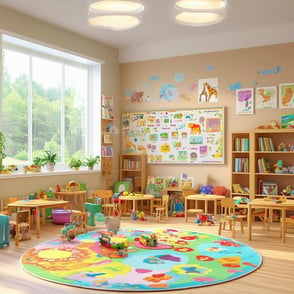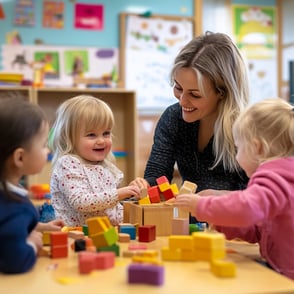John Dewey: Architect of Modern Learning
Before You Continue…
- Loris Malaguzzi and the Reggio Emilia Approach
- Maria Montessori’s Child-Centered Learning Philosophy
- Friedrich Froebel: The Founder of Kindergarten
- Jean Piaget’s Stages of Cognitive Development
- Lev Vygotsky and the Zone of Proximal Development (ZPD)
- Rudolf Steiner and the Waldorf Education Model
When we speak of modern education, student-centered, inquiry-based, real-world focused, we are, knowingly or not, invoking the legacy of John Dewey. An American philosopher, psychologist, and reformer, Dewey reshaped how generations of children around the world would learn.
Born in 1859 in Burlington, Vermont, John Dewey came of age in an era of industrialization and rapid social change. He would go on to become a defining voice in both American philosophy and education, crafting theories that challenged traditional schooling and emphasized experience, democracy, and thought in action.
The Educational Roots of John Dewey
Dewey's early education at the University of Vermont laid the groundwork for his intellectual pursuits. He earned his PhD in philosophy at Johns Hopkins University, where he was influenced by leading pragmatist thinkers like Charles Sanders Peirce and William James. It was during this period that Dewey began forming the basis of what would later become the education theory of John Dewey, a model rooted in practicality, inquiry, and reflective thought.
His early teaching experience convinced him that education needed a radical rethinking. Instead of rote memorization, Dewey believed students should engage with real-world problems and learn through doing. This belief crystallized into what is now widely understood as constructivist learning theory, long before the term itself became popular.
Dewey’s Core Philosophy: Learning by Doing
Dewey’s signature contribution to educational reform was his belief that learning happens best through active, hands-on experience. He saw the classroom as a microcosm of society, a place where students could not only acquire knowledge but also develop critical thinking, social intelligence, and democratic values.
This philosophy is best encapsulated in his 1916 work, “Democracy and Education”, in which Dewey argued that education should prepare learners to be active participants in democratic life. For Dewey, education wasn’t just a means to economic success, it was central to human development and social progress.
His emphasis on democracy in education laid the groundwork for modern progressive schooling. According to Dewey, every student, regardless of background, should have the opportunity to contribute meaningfully to their learning environment, and by extension, to society.
“Education is not preparation for life; education is life itself.” , John Dewey
Experience and Education: Dewey’s Impact on Pedagogy
In his later work, “Experience and Education”, Dewey responded to critics of progressive education by clarifying that not all experience leads to learning. Rather, meaningful experience must be structured and guided to produce educational growth. He introduced the idea that teachers must act as facilitators, helping learners connect prior knowledge to new contexts.
This framework forms the basis of how we think, both in education and in everyday life. Dewey didn’t want passive learners; he wanted problem-solvers, collaborators, and citizens.
His influence is deeply embedded in the constructivist learning theory that dominates contemporary classrooms, where students construct meaning through engagement, reflection, and social interaction.
Global Influence and the Spread of Dewey’s Educational Theory
By the early 20th century, John Dewey’s theory of experiential learning began to influence educational practices far beyond the United States. His ideas resonated in countries undergoing rapid modernization, where traditional rote-based instruction no longer met the needs of emerging democratic societies.
In Europe, educators began adopting Dewey’s principles within national curricula. In the United Kingdom, progressive education models drew from Dewey’s emphasis on learning through doing, particularly in the post-WWII period. While British systems often retained structure and tradition, many of the constructivist principles inspired by Dewey, such as active learning, critical thinking, and student agency, were gradually integrated into early years and primary education.
In other regions, particularly Scandinavia and parts of Asia, Dewey’s impact contributed to reforms in how students interacted with their teachers, each other, and the learning environment.
Comparing Dewey with Other Educational Thinkers
While Dewey is a towering figure in educational reform, his influence becomes even clearer when compared to other renowned theorists.
Maria Montessori
Like Dewey, Maria Montessori believed children learn best through active engagement and independence. However, Montessori's method emphasized carefully prepared environments and self-correcting materials, whereas Dewey focused on social learning, real-world experiences, and democratic participation. Both prioritized child-centered education but from distinct philosophical angles.
Jean Piaget
Jean Piaget’s theory of cognitive development introduced the idea of learning as a staged mental process. While Piaget focused on how children think at different ages, Dewey’s work complemented this by exploring how environment and social context influence learning. Together, their work forms the foundation for today’s developmental and constructivist approaches.
Lev Vygotsky
Vygotsky’s Zone of Proximal Development (ZPD) emphasized the social nature of learning and the importance of scaffolding by adults or more capable peers. Dewey shared Vygotsky’s belief in collaborative, socially contextualized education, though Vygotsky emphasized the role of language in learning more explicitly. Their combined influence is evident in modern cooperative learning and inquiry-based teaching models.
Modern Applications: Dewey in the 21st Century Classroom
Today, John Dewey's ideas are foundational to many education systems that prioritize student-centered learning and reflective practice. Across early years settings, primary schools, and even higher education, his legacy lives on in:
- Project-based learning
- Inquiry-based instruction
- Collaborative group work
- Real-world problem-solving tasks
- Flexible, teacher-guided discovery
Modern pedagogical approaches that emphasize adaptability, metacognition, and social-emotional learning can all trace their lineage back to Dewey’s work. In early years education especially, multisensory exploration, cultural learning, and communication-rich environments reflect Dewey’s values.
For example, at Hatching Dragons, these principles are reflected in our multilingual and multicultural learning environments, where children are invited to construct knowledge through language, play, and global engagement.
Challenges and Criticisms of Dewey’s Ideas
While John Dewey’s educational theory has been widely embraced, it hasn’t been free of critique. Some educators argue that:
- Experiential learning may be difficult to assess through standardized testing
- Not all learning environments have the resources or training to support open-ended, inquiry-based approaches
- His ideas may not align easily with large-scale, exam-driven systems
Nonetheless, educators and researchers continue to refine and adapt Dewey’s legacy to address these challenges, making his work as relevant as ever in discussions about educational equity and reform.
Why Dewey Still Matters
In a world shaped by rapid change, digital transformation, and social complexity, John Dewey's commitment to democratic education and lifelong learning remains vital.
His work underscores that education is not a transaction, but a transformative process, one that develops learners who are capable, compassionate, and prepared to shape their own futures.
For those looking to understand or design effective education in today’s world, studying John Dewey is not optional, it’s foundational.
Conclusion
John Dewey, the American philosopher whose name remains synonymous with progressive education, continues to shape how we teach and learn. His belief in learning through experience, in the power of the social environment, and in democracy as a lived practice within the classroom has permanently altered educational thought.
Whether you're a teacher designing child-led projects, a parent supporting play-based learning, or a policymaker envisioning equitable systems, Dewey’s legacy serves as both blueprint and inspiration.
As we reflect on his contributions, from “How We Think” to “Experience and Education”, and the vision expressed in “Democracy and Education”, we’re reminded that education, at its best, is deeply human, profoundly social, and endlessly evolving.

01-Jan-2025 19:19:23
Related Articles





Write a Comment